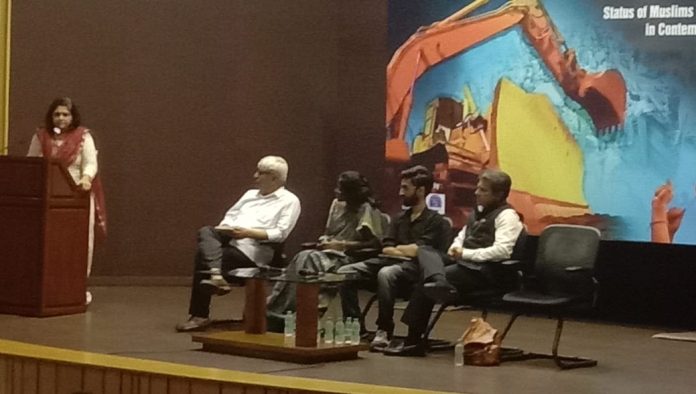
By Mohammed Naushad Khan
NEW DELHI: A gathering of prominent social and human rights activists, lawyers, journalists, academicians, and political leaders was held at Jawahar Bhawan here Saturday to discuss the growing challenges faced by religious minorities in India, particularly Muslims and Christians. The event, organized by ANHAD and the United Christian Forum, focused on the theme “The Quest for Equality and Justice,” examining the current status of these communities in contemporary India. The programme also paid tributes to CPI(M) Sitaram Yechury, recognizing his lifelong dedication to promoting equality and justice. Yechuri died two days ago.
John Dayal, veteran journalist and a leading human rights defender, set the tone of the conference. Dayal highlighted Yechury’s major contributions during his 12 years in the Rajya Sabha, where he advocated for religious minorities, especially Muslims and Christians. He pointed out that under both the first NDA government led by Atal Bihari Vajpayee and the current Modi regime, the laws and actions of the BJP-led government were designed to target the two religious minorities simultaneously. Dayal drew attention to the weaponization of anti-conversion laws, and the Uniform Civil Code, emphasizing how these measures have been used to suppress Christians and Muslims alike.
Dayal also reflected on the misuse of bulldozers as a tool of intimidation. While initially used against Christian schools, the tactic has now become a common form of punishment against the Muslim community. He stressed the importance of unity among Muslims, Christians, Dalits, Tribals, and OBCs, stating that they represent a powerful collective force capable of challenging BJP and the Modi government.
Minakshi Singh, a social activist, speaking about mob violence and lynching, underlined the persecution of both Christians and Muslims. She pointed to the ongoing violence in Manipur, where the government’s inaction, including the prime minister’s failure to visit the state, reflects its complicity in the crisis.
Harsh Mander, founder of Karwan-e-Mohabbat and a former district collector, condemned the use of bulldozers to intimidate Muslims, stating that such actions violate the principles of civilized governance. He emphasized that the response to this state-backed hate must be non-violent and rooted in love.
Teesta Setalvad, representing Citizens for Justice and Peace (CJP), provided a broader historical context, describing the post-2014 violence against Christians, Muslims, Dalits, and other marginalized groups as part of a “counter-revolution.” She argued that even before 2014, India was an incomplete secular republic, but the period since has seen a full-blown assault on constitutional freedoms. Setalvad noted that the 2014 and 2019 Lok Sabha elections played a pivotal role in BJP’s rise, with attacks on minorities intensifying as a form of revenge against their political participation.
She said that the bulldozer action against Muslims by BJP state governments was in revenge against the active role they played in the 2024 Lok Sabha elections.
Michael Williams, founder of United Christian Forum, and Shabnam Hashmi, founder of ANHAD, called for greater solidarity and unity across communities to foster social and cultural harmony. They urged civil society, opposition leaders, and religious figures to counter hate with love and compassion actively. They emphasized that those who have been staunch supporters of secularism are now the worst victims of hate and violence.
Other speakers included Ali Shan Jafri, who spoke on hate speech and crimes, Colin Gonsalves on the rise of “bulldozer raj,” Siju Thomas on anti-conversion laws and “love jihad,” Bhasha Singh on media representation, and Kunwar Danish Ali on the political exclusion of minorities.
The programme concluded with a call for collective action and unity to challenge the growing climate of hate and persecution.




